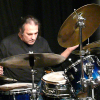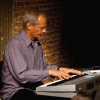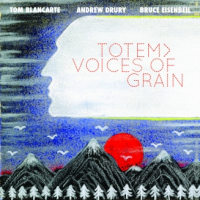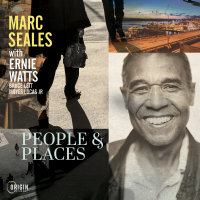Home » Jazz Articles » Interview » Michel Delville: Guitar, Improv & Electro
Michel Delville: Guitar, Improv & Electro

What I like to do in my own work is create the illusion that the improvised parts are written and that written pieces are improvised.

Dave Liebman
saxophoneb.1946

Tony Bianco
drumsMichel Delville: According to my parents, I was a compulsive listener of Mozart and Beethoven at the age of five or six. In my early teens I basically moved from Ero?ca to Heroes... I was really into the Beatles, Bowie, Zappa, Hendrix. I devoured my older brother's record collection and was exposed to musical oddities which have left a mark on my musical development until this day. I studied music at the Seraing [Belgium] Music Academy and then moved to the United States and became largely a self-taught musician foraying into jazz and rock, which is what I am known for in certain circles.
All About Jazz: What were your main formative influences?
MD: My first encounter with "progressive" music in the broad sense was when my brother Gilbert made me listen to Zappa's One Size Fits All (Rykodisk, 1975). Zappa made me realize that it was possible to write music which was both accessible and challenging, experimental and danceable. Later, I began to listen to more "difficult" stuff by Varese, Messiaen, Coltrane's last period.
AAJ: How did you approach Zappa's music?
MD: It soon became increasingly difficult to reconcile my musical training with my passion for Zappa and jazz-rock in general. I used to play Zappa's records and memorize his music. I was really fascinated with his solos and went as far as transcribing them and studying and reproducing every single note and inflection. In my early twenties, I told myself that it was about time I developed my own musical personality, one which would exceed the sum of my past influences. To this day, I am still trying to write and play the music I hear in my head, and wish I could hear on the radio. That's what I set out to do when I returned from the States and I was determined to do it. Looking back on it, I suppose it was rather arrogant of me: I had no idea what the obstacles would be, both on a musical and a non-musical level, you know, writing the music was one thing but finding the right musicians, making it sound good and playing it live was another.
AAJ: Then you encountered the Soft Machine.
MD: I was looking for different models, which were equally exciting but easier to emulate. The Soft Machine was a major discovery. I found their modal jazz easier to apprehend than Zappa's musical contortionism. I met other LiЁЁge-based musicians with whom I founded my first bands in the early 1990s—we would play the Cirque Divers and other small clubs. My first projects generated some interest at a local level—the alternative music scene was pretty strong at the time. The Soft Machine became my second main influence alongside other Canterbury Scene bands such as Caravan, Camel or Hatfield and the North, but there was also Mingus and Coltrane, my other major and lasting influences. I also become more and more interested in electronic music mavericks such as Amon Tobin and Squarepusher. All these musical forms slowly began to fall into place like pieces of an unfinished puzzle or, rather, flow into a dizzying syncretic maelstrom.
AAJ: You have collaborated with quite a few major British jazz musicians.
MD: The first one was

Elton Dean
saxophone1945 - 2006
AAJ: The collaboration with MoonJune has continued ...
MD: Following the release of Elton Dean & the Wrong Object Leo said he wanted to release a studio recording. We got some money from the CommunautЁҰ Fran?aise de Belgique which covered all the expenses, and Stories From The Shed was released in 2008 to critical acclaim and modest box office success. The album got us on the road for 2 years, and we played in more than fifteen different countries with the band's Shed line-up, which comprised Laurent Delchambre, Jean-Paul EstiЁҰvenart, Fred Delplancq and Damien Polard. Leo has continued to support my musical efforts and I became a kind of artist-in-residence at MoonJune, with eight albums released in the space of eight years. Leo and I have a relationship based on trust and he always gives me complete freedom to do the job.
AAJ: You have founded and co-founded several other bands over the last few years.
MD: doubt was Leo's idea—at the time, he wanted me and

Alex Maguire
keyboardsb.1959

Tony Williams
drums1945 - 1997

Harry Beckett
flugelhorn1935 - 2010

Annie Whitehead
tromboneb.1955

Robert Wyatt
drums
Anthony Braxton
woodwindsb.1945
AAJ: There is also Machine Mass which played the LiЁЁge Jazz festival in May, 2013.
MD: Machine Mass was originally a duet Tony Bianco and I created in 2010. Our first album came out in 2011 and marked a new turn in my development as a musician, as computers and electronics have become an integral part of the writing process. Our current repertoire has an electro-jazz-groove flavor but we are also using more "ethnic" instruments such as the bouzouki, the tempura, and the wooden flute. We use computer-generated loops and samples which we control and manipulate live. If I had to describe the music of Machine Mass (or my other bands for that matter), I wouldn't use the word "fusion"—which smells increasingly funny. Of course, we like to combine composition and improvisation, jazz and "world music," but we also incorporate elements of jazz, punk, psychedelia and very long loops, which is very unusual in the world of electronic music, where the loop is essentially used for a short segment, reinforcing the beat. Some people have also connected it with

Miles Davis
trumpet1926 - 1991

Ornette Coleman
saxophone, alto1930 - 2015
AAJ: The new Machine Mass album, which you've recorded with

Dave Liebman
saxophoneb.1946
MD: For Tony, it is the continuation of an electro-jazz band he started with Dave years ago and which was called Monkey Dance—they had an album released by FMR in 2006. Machine Mass revived that project, and Tony asked Dave (who had heard the first Machine Mass CD) if he'd like to do a recording with us as a trio. We went into the studio in the fall of 2012 and recorded the album in one day. Prior to that we exchanged charts and ideas for structures—the rest happened in the studio, where playing with Dave and Tony proved extremely enriching and inspiring. It really became a collective endeavor as Dave was involved in the different stages of the mix and co-authored some of the tracks. To me it's a very different album, full of different colors, strange drones and deeper, spiritual textures.
AAJ: How would you describe your guitar sound?
MD: My guitar sound is characterized by a fair amount of distortion, which does not always please the ears of certain jazz listeners! This being said, prog rock promoters are generally much more conservative than the jazz scene. A band like "Aka Moon," to cite one of our Belgian glories, would not have been taken seriously if jazz producers had a narrow mentality. As far as I am concerned, my heavily distorted sound has always gone down pretty well with jazz audiences in Belgium and abroad. I also use the Roland guitar synth quite a lot, which is another useful addition to my sonic palette.
AAJ: Improvisation is a major ingredient in your music. Is it a form which needs to be worked upon?
MD: At the risk of sounding trite, improvisation is one of those things which you cannot learn at music academies and conservatories—it requires a substantial musical background, a knowledge of past and present forms.

Derek Bailey
guitar1932 - 2005
Photo Credit
Elisabeth Waltregny
Tags
Michel Delville
Interview
Jean-Pierre Goffin
United States
New York
New York City
Dave Liebman
Tony Bianco
Elton Dean
Alex Maguire
Tony Williams
Harry Beckett
Annie Whitehead
Robert Wyatt
anthony braxton
Miles Davis
Ornette Coleman
Derek Bailey
Comments
PREVIOUS / NEXT
Support All About Jazz
 All About Jazz has been a pillar of jazz since 1995, championing it as an art form and, more importantly, supporting the musicians who make it. Our enduring commitment has made "AAJ" one of the most culturally important websites of its kind, read by hundreds of thousands of fans, musicians and industry figures every month.
All About Jazz has been a pillar of jazz since 1995, championing it as an art form and, more importantly, supporting the musicians who make it. Our enduring commitment has made "AAJ" one of the most culturally important websites of its kind, read by hundreds of thousands of fans, musicians and industry figures every month.
Go Ad Free!
To maintain our platform while developing new means to foster jazz discovery and connectivity, we need your help. You can become a sustaining member for as little as $20 and in return, we'll immediately hide those pesky ads plus provide access to future articles for a full year. This winning combination vastly improves your AAJ experience and allow us to vigorously build on the pioneering work we first started in 1995. So enjoy an ad-free AAJ experience and help us remain a positive beacon for jazz by making a donation today.

New York City
Concert Guide | Venue Guide | Local Businesses
| More...







 Buy Now
Buy Now






















